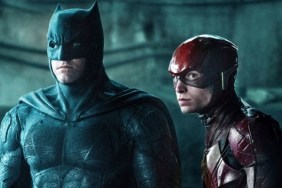When I launched Best Episode Ever, I knew that “Lost” would be my very own personal smoke monster I would have to face one day. When Damon Lindelof left Twitter due to the constant criticism he took for “Lost” and his film screenplays, I felt it was time again to champion the vision Lindelof saw through to the end.
You see, I was a “Lost” defender for all six years, especially after half the audience turned. While many were waiting for answers that were, perhaps foolishly, promised by Lindelof, I knew that “Lost” was never about answers. It was about experiencing a world with different rules, rules that may not have been concretely nailed down but made metaphysical sense, and seeing how many different stories they could tell and how many ways they could switch up the format (flash forwards? Hello!).
My number one rule for any film or television series, any work of fiction really, is that the only reason ever needed to justify anything is “because it’s awesome.” “Lost” was the “because it’s awesome” of television. Why are there polar bears on the island? Because it’s awesome. Now they would answer why the Dharma group experimented on polar bears, but that answer is not nearly as awesome as the idea of frigging polar bears on a tropical island.
Some viewers were so disappointed in that explanation that they refused to believe that was the answer. So it would go with most of “Lost”’s answers, proving to me that if you were looking for answers, you were watching “Lost” wrong. Perhaps even its creators didn’t realize that “Lost” wasn’t about providing answers, and fell into their own trap of trying to please viewers looking for answers. To me, if your enjoyment of six years of television is dependent on the answers given at the end, that seems like a waste of six years of viewing. I was in it for the ride.
So after acquitting myself that I would be watching “Lost” for six years whether there were answers or not, I was most surprised when they gave us the biggest answers of all. Yet it was the episode that many “Lost” fans and “Lost” haters hated the most. Some even refused to believe that these answers were answers. The Best Episode Ever of “Lost” was “Across the Sea.”
“Across the Sea” aired third to last in the final season of “Lost.” It was the flashback of all flashbacks that took us to the beginning of the island, leading some skeptics to ask “What was before the beginning?” Part of the point is you could always wonder what came before the before, but you have to start somewhere. For years we’d encountered Jacob (Mark Pelligrino) and the Man in Black (Titus Welliver) and wonder about their powers, and how they even fit into this whole time traveling hatch button pressing island. If one doesn’t like these answers, that’s fair. I was more surprised to see people refuse to acknowledge the answers given. After “Across the Sea” people still said, “They never said what the island was.” That, among other answers, is explicit in the episode. If you were waiting for that for six years, you ought to have been relieved by “Across the Sea.”
What is the island? It’s the source of all life. That’s what it is. They say that. Well, they’re a little arty about it. The island is the source of the light that exists little by little in every human. That is the essence of life, and the island stores it all. We can’t have more than our share though, so someone has to protect the cave of light from intruders. That’s fairly abstract, but it’s as metaphysically specific as you can get. Source of all life. Keep it safe. I was happy to believe the island was just some cool place where crazy stuff happened, but it’s the source of all life! That’s beautiful.
What happens if you do go into the cave of light? You become a smoke monster. Who is the Man in Black? He’s the smoke monster. Those are pretty big answers. I was also okay with “ambiguous bad guy” but “Lost” gave us more. Even questions I didn’t really care about got answered. They show Man in Black building the wheel that Ben used at the end of season four. That part is a little vague on the technology, but since time traveling islands don’t really exist, it’s enough that they say that Man in Black and his team were working on it for years and figured it out.
The story of “Across the Sea” is that Claudia (Lela Loren) crash lands on the island in labor and gives birth to twins. She names one Jacob but didn’t have a name for the other. The woman (Allison Janney) who helps Claudia deliver them murders her and raises the babies. Even as Claudia starts asking where she is and stuff, the woman who would come to be known as Mother tells her that every question only leads to another question. That’s a manifesto on the entire series, but “Across the Sea” has an interesting answer to that problem too.
As Jacob and his brother grow up, Mother tries to give them answers to their curious questions, only her answers are lies. We know they are lies, like the island is all there is, the kids came from Mother, etc. We know there is a world outside the island, even in the “Lost” universe, and we already saw that they had a different mother. So when you try to give rock solid answers that are not the truth, it’s impossible. Someone can always poke holes in the lie. That is the essential conundrum of “Lost.” This is a made up story. It’s invented fiction. No matter how good it is, and it is damn good television, they’re never going to be able to give 100% convincing answers to something that is not true.
This creates two types of children. Jacob grows up naive and innocent, believing everything Mother tells him. Man in Black grows up resentful. He’s looking for a family that Mother wants to deny him. It’s tragic. He’s a prisoner and he wants to leave. That’s essentially the “Lost” audience too. Half of us were willing to go with whatever they threw at us, the other half growing resentful that the answers only led to more questions.
Maybe “Across the Sea” is an easier pick than the episodes that featured the central ensemble. We get a complete beginning, middle and end of Jacob and Man in Black’s story that we don’t have to compare to other episodes of character development. That sort of culmination and meta encapsulating the entire “Lost” phenomenon blew me away, after six years of resigning myself to experiencing vague mystery.
Ultimately, it doesn’t totally matter that the island is the source of all life. That’s as good a reason as any for our heroes to protect it, but the more important reason is that it’s been theirs and our home for six years. The finale would deliver a battle for the fate of the island, that would get overshadowed by the resolution of the sideways subplot. But really the end of “Lost” is that they saved the island. The End. But along the way, “Across the Sea” was the Best Episode Ever.
Come back, Damon. I still believe in you.









